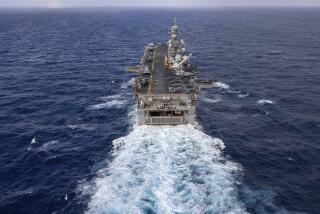U.S. Won’t Pass Tin Cup to Allies for Gulf Fleet: Shultz : Escort Role Limited --Carlucci
- Share via
VENICE, Italy — Secretary of State George P. Shultz today scoffed at the idea of the United States’ passing “a tin cup” for help in keeping the Persian Gulf open, while another official ruled out asking Japan to pay.
Staking out a limited role for U.S. Navy escorts for oil tankers in the volatile gulf, National Security Adviser Frank C. Carlucci expressed satisfaction with the support allied leaders registered at the economic summit here for freedom of navigation in the waterway.
He ruled out requesting compensation from Japan for the U.S. naval presence in the gulf or for putting 11 Kuwaiti tankers under the protection of the American flag.
“We are not going to ask the Japanese to pay for escorting U.S. flag vessels to Amsterdam,” Carlucci told a news conference on the summit’s last day.
Japan gets 60% of its oil from the Persian Gulf, while Western Europe obtains 30% of its energy from the area and the United States only 6%.
“I think it would be wrong for the United States to take a tin cup around here and say we can’t finance six ships in the Gulf,” Shultz said on ABC’s “Good Morning America.” “That’s ridiculous.”
Reconstruction Period
Shultz said the Japanese will eventually “pitch in” by considering the financing of a reconstruction period at the end of the Iran-Iraq War.
He said the United States asked only diplomatic support and not financial assistance from its allies at the summit.
Asked why a joint statement on the gulf issued Tuesday did not specifically endorse U.S. efforts to escort the Kuwaiti tankers or warn Iran about the deployment of missiles, Shultz said, “The communique is very adequate and very strong and asserts the things that need to be asserted.”
The communique merely reaffirmed that freedom of navigation in the gulf is of “paramount importance” and said the free flow of oil “must continue unimpeded.”
Carlucci said the U.S. Navy will occasionally escort other nations’ merchant vessels through the tense gulf but is on patrol duty mostly to protect ships flying the American flag.
The flagging of the Kuwaiti oil tankers, which will also include putting an American captain in charge, is expected to be completed later this month, but Defense Secretary Caspar W. Weinberger told Congress today that no ships will be escorted until July.
‘Selective Basis’
Carlucci said the Navy will escort the U.S.-flagged vessels. Otherwise, he said, they will protect other nations’ merchant ships “on a selective basis.”
Responding to a suggestion that the Pentagon had left the impression the Navy would provide a wider escort service, Carlucci said: “I never said that. We have not. We are talking about escorting U.S. flag vessels.
“That does not preclude, on a case-by-case basis, escorting a non-U.S. flag vessel where the cargo is of particular importance,” he said.
The Navy earlier this year escorted the delivery of U.S. tanks to Bahrain.
Carlucci, in a separate CBS-TV interview, said the United States has not sent an “explicit warning” to Iran not to deploy Silkworm anti-ship missiles provided by China.
“We are simply advising Iran that we intend to escort our ships and we intend to defend our ships as appropriate,” he said.
Carlucci said the missiles, which are near deployment, add “a new dimension to the threat” to shipping in the gulf. “We think the Iranians need to think twice before they use that kind of a weapon to interfere with freedom of navigation,” he said.
More to Read
Sign up for Essential California
The most important California stories and recommendations in your inbox every morning.
You may occasionally receive promotional content from the Los Angeles Times.













